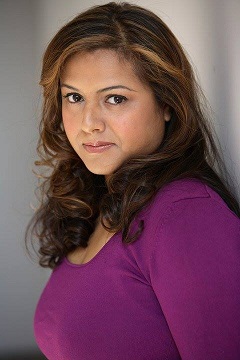
Sharbari Ahmed writes fiction, screenplays and plays. Her debut collection The Ocean of Mrs Nagai: Stories was released in 2013 by Daily Star Books and has been reviewed on The Aerogram. She won The First Words Literary Prize for South Asian American Writing for her story “Raisins Not Virgins” which she then turned into a stage play performed in New York, Los Angeles, Boston and Dhaka. A screenplay version was nominated for Best Original Screenplay at the Tribeca Film Festival.
She now writes for ABC’s new thriller series on terrorism starring Priyanka Chopra, Quantico, which has been renewed for a second season on the network. Ahmed is also working on a novel, Dust Under Our Feet, set against the backdrop of WWII in colonial Calcutta. She was born in Bangladesh and raised in New York, Connecticut and Ethiopia. Contributor Dipti Anand reached out to ask her about writing, identity, her debut short story collection and Quantico.
What is a secret you can share about your writing process/method?
I have no major process secrets. I just know that if I apply myself daily, even for a small amount of time, I produce at a rapid rate.
How introverted/extroverted are you and how much has writing played a part in shaping that?
I am both introverted and extroverted. It all depends on the situation. But writers are generally in their own head and prefer their own company. We need stillness to create sometimes. Sometimes we need the din of daily life around us in order to do so.
Your characters in The Ocean of Mrs. Nagai are seekers both inwards and out, and their curiosity always seems to spark communication and action. They’re talkative, confessional and in being both, are informative to a reader who, say, is from the other side of the world. Has the tradition of oral storytelling been a particular influence on you in understanding Bangladesh’s history and your own?
Yes, definitely. I remember listening to stories growing up. The Bengali tradition of adda, shooting the breeze, letting the conversation flow wherever it takes you, was a great way to hear stories and learn about my family and cultural history.
Do you draw inspiration for characters from people in your life? What do you do if someone confronts you about showing up in one of your stories?
I find inspiration everywhere — even from strangers. Because inspiration is all around us. If I create a character with someone in mind I would take into consideration why I need this character and why I need this real life person to fill in the blanks for me. If someone confronts me I would assume it’s because it’s not a flattering portrait. Which means I don’t give a rat’s ass what they think.
You’re the writer of hit TV show Quantico which — though meant for entertainment — fosters a discussion on diaspora identity and assimilation, thematically akin to your own writing. How does your experience as a screenwriter compare to being an author? Have you ever thought about adapting your short stories/novels into visual media?
I was one of a team of nine for season one of Quantico and working on that show was so different than being alone, working on stories and a novel. Writing a novel is solitary. At Quantico, I was in a room with others. Ideas and thoughts were flying at an intense pace at times. If I put forth an idea, it was accepted or rejected almost then and there. Now I am moving more towards screenplays and yes I have thought about it. In fact I plan to adapt my novel into one and have started the adaptation on a story, called Dervish that was published in this great international journal called Wasafiri last December. Screenwriting is more about the visual aspect of storytelling. Using the camera and lighting and sound and objects as well as the lines and the actors to push a narrative forward.
The world is getting smaller and as a result, cultural dialogue is becoming richer and even more complex. How do you find your identity as a South Asian writer impacts the reception of your work? Do you think geographies are important to understanding human conditions as well as the authors who write about them? In other words, can a writer ever escape where they’re from to produce work that’s universal at heart?
I sincerely hope we can escape where we are from to create stories that resonate! If not we are shoddy storytellers. Whether it’s a geographical location, a religion or even a social strata that we belong to or are assigned by happenstance at birth, writers should be able to transcend this. I watched The Remains of the Day recently and it’s based on a novel by a Japan-born British novelist Kazuo Ishiguro, set in WWII England and about a white butler who serves in an aristocrat’s house. There was nothing Japanese about this story or Asian. It was marvelously rendered, not a false note. But to go back to your first question: alas, my ethnicity did and does at times affect the way my work is received. I think its changing slowly, but Western publishers and agents tend to pigeon hole us. Though I got lucky with my agent. She does not think in stereotypes or have any pre-conceived notions of what a South Asian female should be writing about.
* * *
Dipti Anand is an poet, writer, editor and academic, living and working in New Delhi, India. To connect with and read more of Dipti’s reverie and creative work, visit www.diptianand.com.












